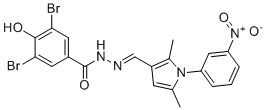
Kinesore
CAS No. 363571-83-9
Kinesore( Kinesore )
Catalog No. M14249 CAS No. 363571-83-9
Kinesore is a small molecule activator of kinesin-1 that inhibits KLC2-SKIP interaction with IC50 of 101 uM, Ki of 49 uM.
Purity : >98% (HPLC)
 COA
COA
 Datasheet
Datasheet
 HNMR
HNMR
 HPLC
HPLC
 MSDS
MSDS
 Handing Instructions
Handing Instructions
| Size | Price / USD | Stock | Quantity |
| 100MG | Get Quote | Get Quote |


|
| 200MG | Get Quote | Get Quote |


|
| 500MG | Get Quote | Get Quote |


|
| 1G | Get Quote | Get Quote |


|
Biological Information
-
Product NameKinesore
-
NoteResearch use only, not for human use.
-
Brief DescriptionKinesore is a small molecule activator of kinesin-1 that inhibits KLC2-SKIP interaction with IC50 of 101 uM, Ki of 49 uM.
-
DescriptionKinesore is a small molecule activator of kinesin-1 that inhibits KLC2-SKIP interaction with IC50 of 101 uM, Ki of 49 uM; inhibits kinesin-1 interactions with short linear peptide motifs found in organelle-specific cargo adaptors, yet activates kinesin-1's function of controlling microtubule dynamics in cells; induces the remodeling of the microtubule network.
-
In VitroRemarkably, in kinesore-treated cells, the microtubule network is entirely reorganized into a series of loops and bundles. In addition, the lysosomal compartment accumulates in a juxtanuclear position, where there are relatively few microtubules. At 50 μM kinesore, this phenotype is highly penetrant, with 95±2.4% (n=3, total of 200 cells) of cells exhibiting a reorganized nonradial microtubule network. In titration experiments, in cells treated for 1 h, this phenotype becomes apparent at a concentration of 25 μM kinesore, with relatively little effect at or below concentrations of 12.5 μM. The effect is reversible because a 2-h washout of kinesore from cells treated for 1 h led to the reestablishment of the radial microtubule array. This kinesore-induced reorganization of the microtubule network is observed in a panel of mammalian normal and cancer cell lines. In wild-type cells, 50 μM kinesore induces the remodeling of the microtubule network and the formation of extensive microtubule-rich projections. This phenotype is strongly suppressed in Kif5B knockout cells, confirming that microtubule remodeling induced by kinesore is dependent upon the presence of kinesin-1.
-
In Vivo——
-
SynonymsKinesore
-
PathwayCytoskeleton/Cell Adhesion Molecules
-
TargetKinesin
-
RecptorKinesin
-
Research Area——
-
Indication——
Chemical Information
-
CAS Number363571-83-9
-
Formula Weight536.18
-
Molecular FormulaC20H16Br2N4O4
-
Purity>98% (HPLC)
-
SolubilityDMSO : 125 mg/mL 233.14 mM
-
SMILESO=C(N/N=C/C1=C(C)N(C2=CC=CC([N+]([O-])=O)=C2)C(C)=C1)C3=CC(Br)=C(O)C(Br)=C3
-
Chemical Name(E)-3,5-Dibromo-N'-((2,5-dimethyl-1-(3-nitrophenyl)-1H-pyrrol-3-yl)methylene)-4-hydroxybenzohydrazide
Shipping & Storage Information
-
Storage(-20℃)
-
ShippingWith Ice Pack
-
Stability≥ 2 years
Reference
1. Randall TS, et al. Proc Natl Acad Sci U S A. 2017 Dec 26;114(52):13738-13743.
molnova catalog



related products
-
GW406108X
GW406108X (GW-406108X, GW108X) is specific inhibitor of Kif15 (Kinesin-12) with IC50 of 0.82 uM in ATPase assays.
-
Merestinib
LY2801653 is an orally available, small molecule inhibitor of the proto-oncogene c-Met (Ki: 2 nM) with potential antineoplastic activity.
-
Kif15-IN-1
Kif15-IN-1 is a potent, selective inhibitor of KIF15 motility, can act synergistically with Eg5 inhibitors to impair cancer cell proliferation.



 Cart
Cart
 sales@molnova.com
sales@molnova.com


